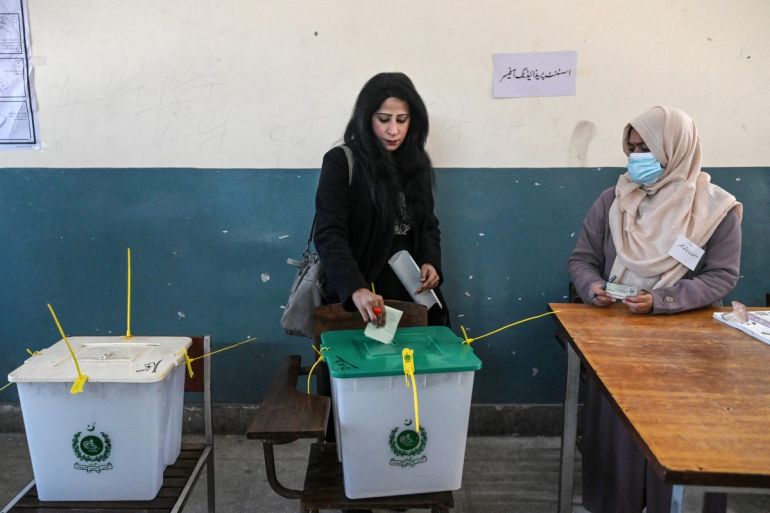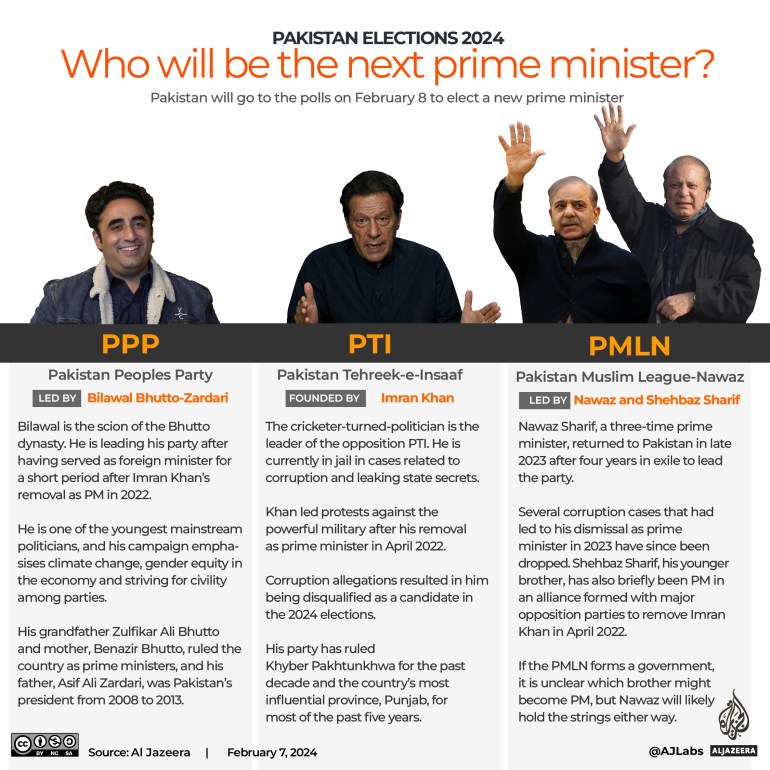‘Inherently undemocratic’: Pakistan suspends mobile services on voting day
The government temporarily suspends mobile phone services as it holds the parliamentary and provincial election.

Pakistan has suspended mobile phone services nationwide on election day, in a move a digital rights group said was “inherently undemocratic”.
A statement from the Ministry of Interior on Thursday said “precious lives have been lost” in recent armed attacks and such “security measures are essential to maintain the law and order situation and to deal with potential threats”.
Keep reading
list of 4 itemsAs election campaign ends in Pakistan, many lament Imran Khan’s absence
Twin bombings kill at least 28 as Pakistan prepares for elections
Pakistan election 2024: How the voting works
One police officer was killed on Thursday when gunmen opened fire on a patrol vehicle in the northwestern area of Tank, local media reports said.
At least 28 people were killed in twin bomb blasts outside candidates’ offices in the southwestern province of Balochistan on Wednesday in attacks claimed by the ISIL (ISIS) group, and two candidates have been shot dead in the lead-up to the vote.
NetBlocks, a global internet watchdog, said data confirmed there was a disruption to mobile phone and internet services “corroborating widespread user reports of outages”.
“The ongoing election day internet blackout in Pakistan is amongst the largest we have observed in any country in terms of severity and extent,” NetBlocks director Alp Toker told AFP news agency.
“The practice is inherently undemocratic and is known to limit the work of independent election observers and cause irregularities in the voting process.”
Pakistan also temporarily shut some of its land borders with Iran and Afghanistan to beef up security amid a surge in violence.
The suspension of mobile services also follows a call by jailed former Prime Minister Imran Khan to his supporters to wait outside polling booths after voting until results are announced.
Last year, Khan’s supporters ransacked several government buildings and clashed with troops as they tried to prevent his arrest.
Al Jazeera’s Assed Baig, reporting from Lahore, said the suspension of internet and mobile networks is an issue for local election observers who have to go to different polling stations and need to communicate with other observers.
“But the suspension of internet services is also an issue for people who are voting. It is affecting people who are using apps and websites to see who they will be voting for, and what their election symbol is,” he said.
“And the party that is going to be most affected by this is the PTI because it has relied heavily on social media,” he said, referring to Khan’s Pakistan Tehreek-e-Insaf (PTI) party.

Thursday’s election has already been marred by allegations of pre-vote rigging, and pollsters have predicted a low turnout following Khan’s imprisonment and the crackdown on his PTI.
Unofficial first results in the parliamentary and provincial election are expected a few hours after voting closes at 5pm (12:00 GMT) and a clearer picture is likely to emerge early on Friday.
The main contests are expected to be between candidates backed by Khan, whose PTI party won the last national election, and the Pakistan Muslim League (PMLN) of three-time premier Nawaz Sharif, who is considered the frontrunner.
Bilawal Bhutto Zardari, the 35-year-old son of former premier Benazir Bhutto, has also run an aggressive campaign in an outside bid for the top office.
Due to mobile service suspension on polling day:
– voters can't coordinate with each other
– ECP's SMS service with vital info not accessible
– candidates can't coordinate with Polling Agents
– voters can't inform ECP of irregularitiesWHAT FARCE IS THIS?#Election2024pakistan
— Syed Ali Abbas Zaidi (@Ali_Abbas_Zaidi) February 8, 2024
Michael Kugelman, director of The South Asia Institute at the Woodrow Wilson International Center for Scholars in Washington, said the suspension of mobile services was “an ominous start to election day”.
“It’s clear, based on the steps they took as soon as the polls opened, that the powers that be remain concerned about the PTI’s possible electoral impact. Especially its turnout potential,” he said.
Mobile phone services were not disrupted in 2018, when analysts said security concerns were greater, with a bombing at an election rally killing more than 140 people.
On that election day, more than 30 people were killed in a blast in Quetta claimed by an ISIL chapter.
Pakistan’s authorities regularly cut access to mobile phones during major protests or during festivals when religious tensions rise, to prevent armed fighters from communicating with each other. Jammers are also used to prevent bombs from being triggered via mobile phones.
Analysts say there may be no clear winner in the election, but the powerful military generals could play a role. The army has dominated the nuclear-armed country either directly or indirectly in its 76 years of independence. But for several years it has maintained it does not interfere in politics.
“The deciding factor is which side the powerful military and its security agencies are on,” said Abbas Nasir, a columnist. “Only a huge turnout in favour of PTI can change its fortunes.”